We are a society that depends on instantaneous lifestyles, connectivity and digital solutions. In fact, we are the impatient generation and therefore laborious tasks like car maintenance feel like a chore.
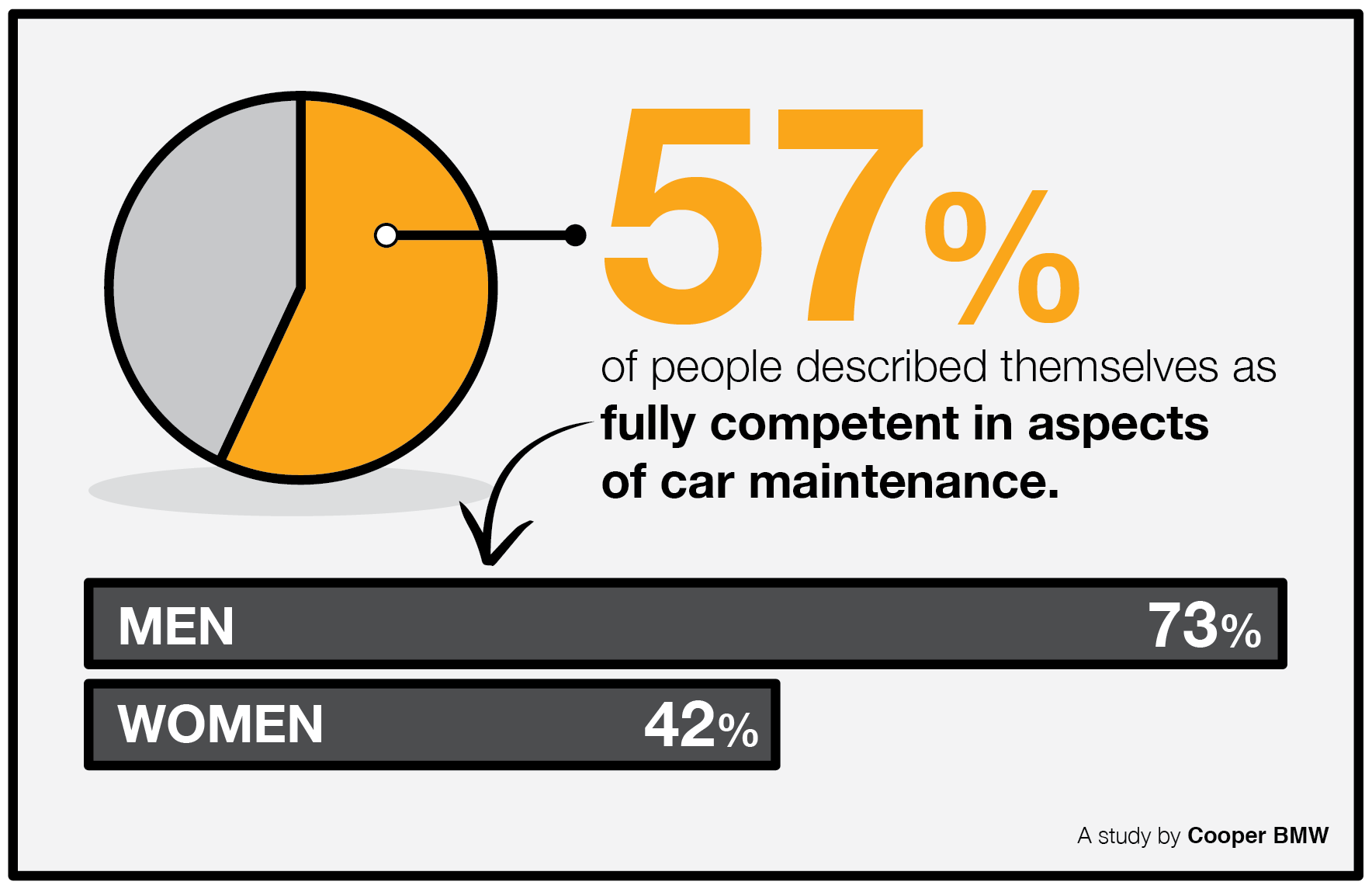 Despite 57% of drivers claiming to be fully competent at car maintenance, our own research revealed this probably isn't the case, with poor understanding of car maintenance evident across the board. And cementing some stereotypes, women were less likely to feel they were competent- at 42%, than men- at 73%.
Despite 57% of drivers claiming to be fully competent at car maintenance, our own research revealed this probably isn't the case, with poor understanding of car maintenance evident across the board. And cementing some stereotypes, women were less likely to feel they were competent- at 42%, than men- at 73%.
Unsurprisingly, over 61's had a tendency to be more competent, with 17-25-year old's the least competent. Across all age groups nationwide, some 40% admitted to not fully understanding the consequences of poor upkeep of their vehicle.
Often, it's not until the colder days arrive that we realise our maintenance mistakes. With long, dark nights quickly taking the place of bright afternoons and temperatures plummeting, failure to carry out some basic checks could reduce your cars eventual lifespan by as much as 25%.
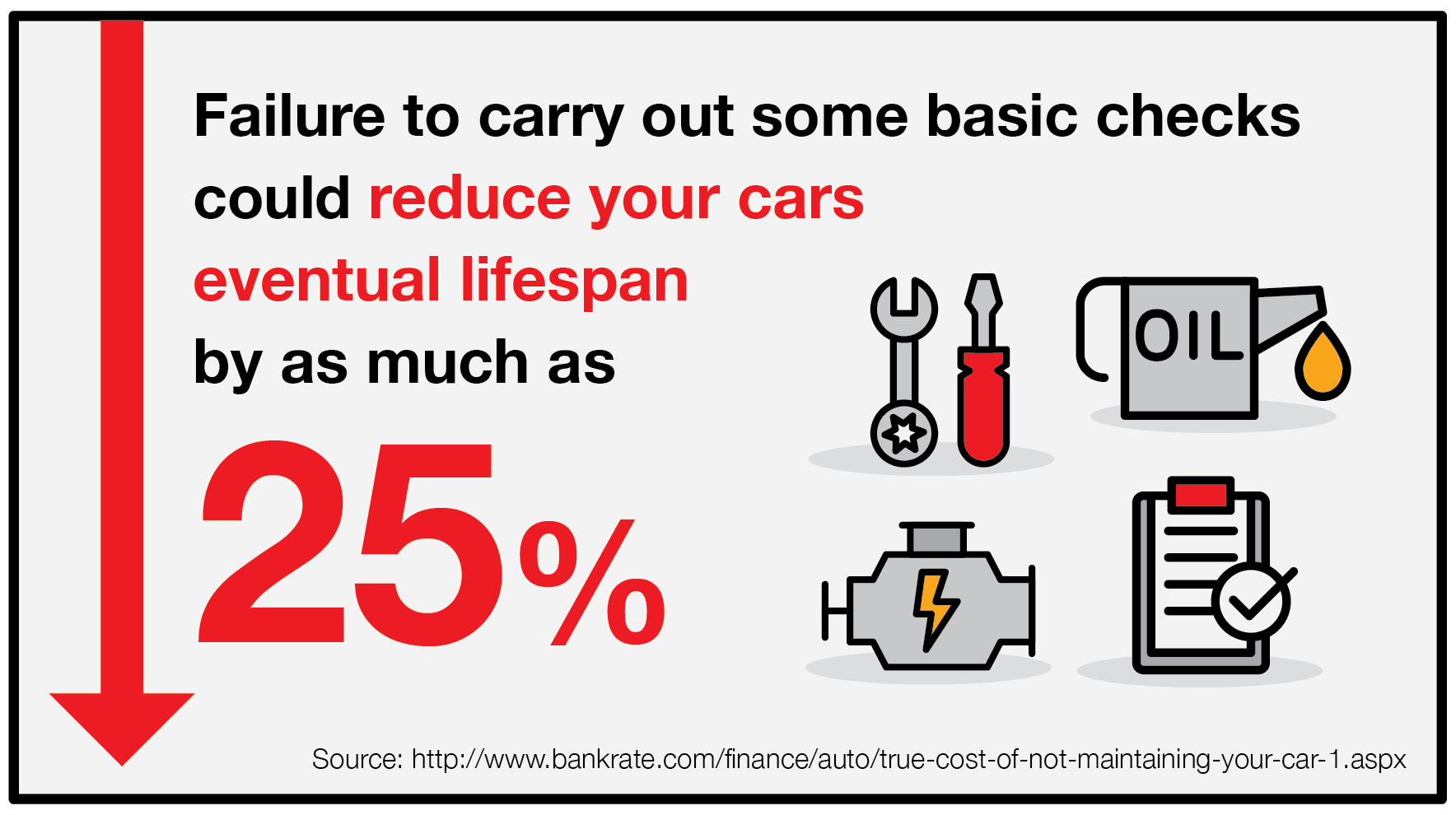
Whether your car is like your baby or just four wheels that gets you from A to B, we can all recall that dreaded feeling when something breaks or malfunctions. Let's be honest, it really isn't worth the hassle, cost or more importantly, the risk.
So are people really as competent as they believe? Read on for some tips before scoring yourself using our quiz below!
Emergency preparation
Remember those classic movie scenes where the cast to get stranded with an empty petrol can and no phone charger, at which point you pipe up to say it would "never happen"? Well, it does… Green Flag predict 900,000 British motorists will breakdown during November, January and December alone - that's one every 6 seconds.
Emergency prep is a massively important element of driving that is hugely ignored. Official advice urges drivers to keep a wide range of supplies stored in their vehicle – just in case.
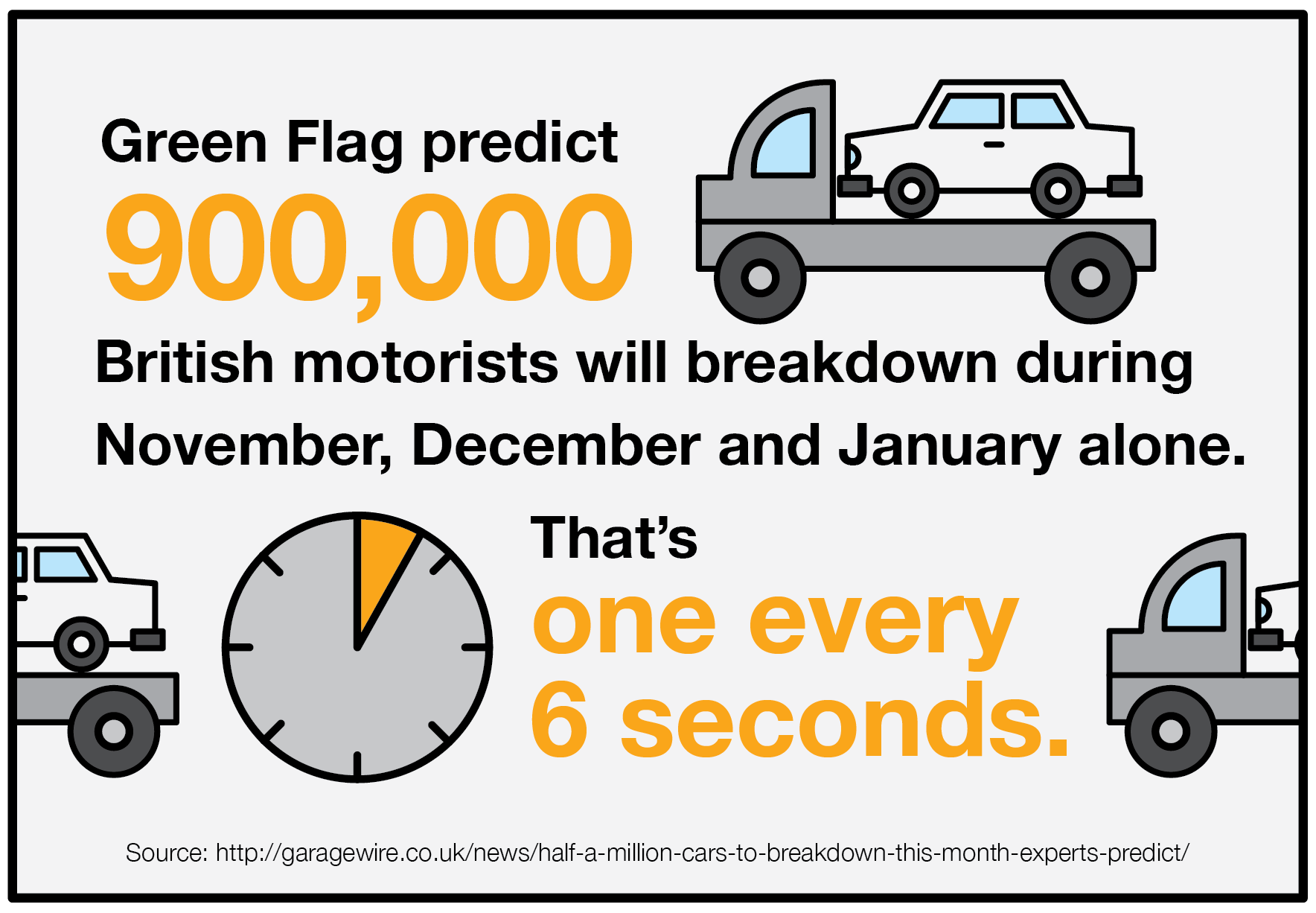
These items include de-icer, a windscreen scraper, a tyre jack, a phone charger, water for the car, drinking water, warm clothes, a blanket, engine oil and a shovel.
Our research however, suggests this advice falls on deaf ears for many. A startling 6% admitted carrying nothing for an emergency with almost all of the items carried by less than half of drivers. Less than a third think about a blanket and barely one in five remember a shovel.
Windscreen washer fluid
Jargon-buster:
This ensures our windscreen is kept fully clear of dirt and debris as we drive. It's particularly important during the darker months.
The reality:
42% of people admitted to us that they check the level of their washer fluid less than once every two months.
The risk:
These people run the risk of being caught empty while driving, and are at danger of an accident due to poor visibility. Longer nights, falling leaves and muddy road surfaces increase the risks in winter, all drivers need to be able to effectively clean their windscreen at any time.
How-To
- Simply pop open the bonnet and find the fluid cap.
- If it's looking a little empty, grab a funnel and pour in some fluid, which you can pick up from most garages or auto-parts stores.
Tyre Pressure
Jargon-buster:
This refers to the volume of air inside your tyres. The higher your tyre pressure, the more air there is in the tyre. It's measured in PSI (pounds per square inch) or in 'Bars', and will naturally reduce over time.
The reality:
Many people are oblivious to the importance of ensuring the pressure of their car tyres is right.
Just under half of people questioned admitted to checking less than once a month, as is recommended, with a staggering 60% of women falling into this category. Shockingly, one in six said they can't competently check at all.
The risk:
Both underinflated and overinflated tyres cause big problems.
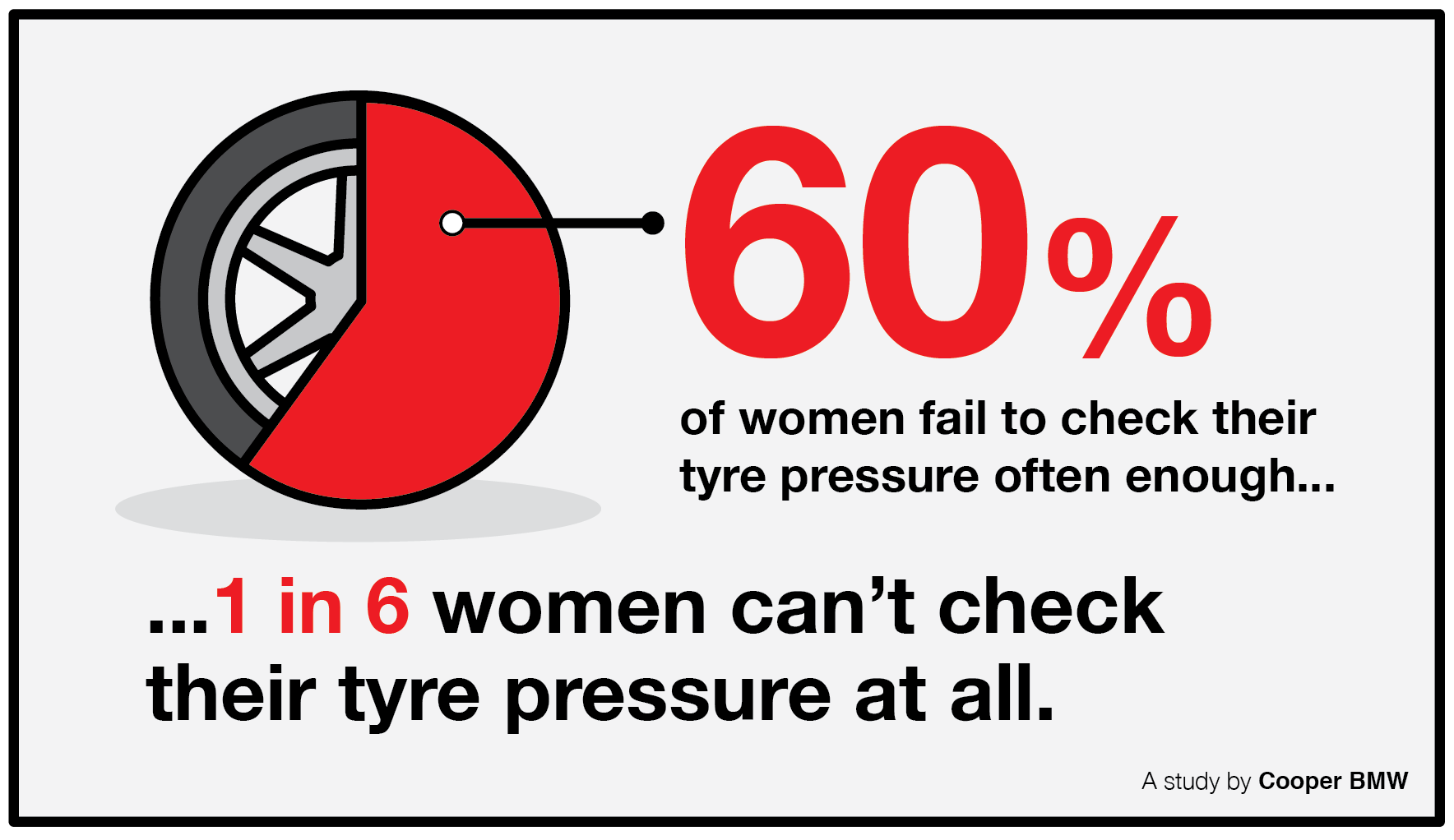
Under inflation means more of the surface of the tyre touches the road. This increases friction, which slows the car down - so more power (fuel) is required to move the car.
Over inflation causes the opposite. Too little of the tyre's surface touches the road, leading to poor braking distances and reduced traction, and on icy winter roads, this can be seriously dangerous.
A tyre that is just 25% above or below its optimum pressure can see its lifespan cut by a quarter.
How-To
Your car's optimum tyre pressure should be displayed in its manual, on the driver's door or beneath the fuel cap.
- Grab/buy a pressure gauge.
- Take off the dust cap on the tyre's valve, fix on the pressure gauge and take a note of the result.
- If it's too low, inflate using an air pump at home or using the facilities provided at many petrol stations.
- If the tyre is overinflated, you can allow air to escape whilst the dust cap is off.
Tyre treads
Jargon-buster:
Tyre treads are a network of grooves within the surface of your tyre. These are designed to channel water off the main surface of your tyre, stopping water from raising your tyres off the road.
The reality:
Our research showed that as many as one in 10 people never check their tyre treads at all, and nearly two thirds of those we asked admitted they check them less than once every four months.
The risk:
Checking your tyre treads is important in winter as they help remove water from the contact area between your tyre and the road. If they're too shallow, they can't do this and you're at a much higher risk of being in, or causing an accident.
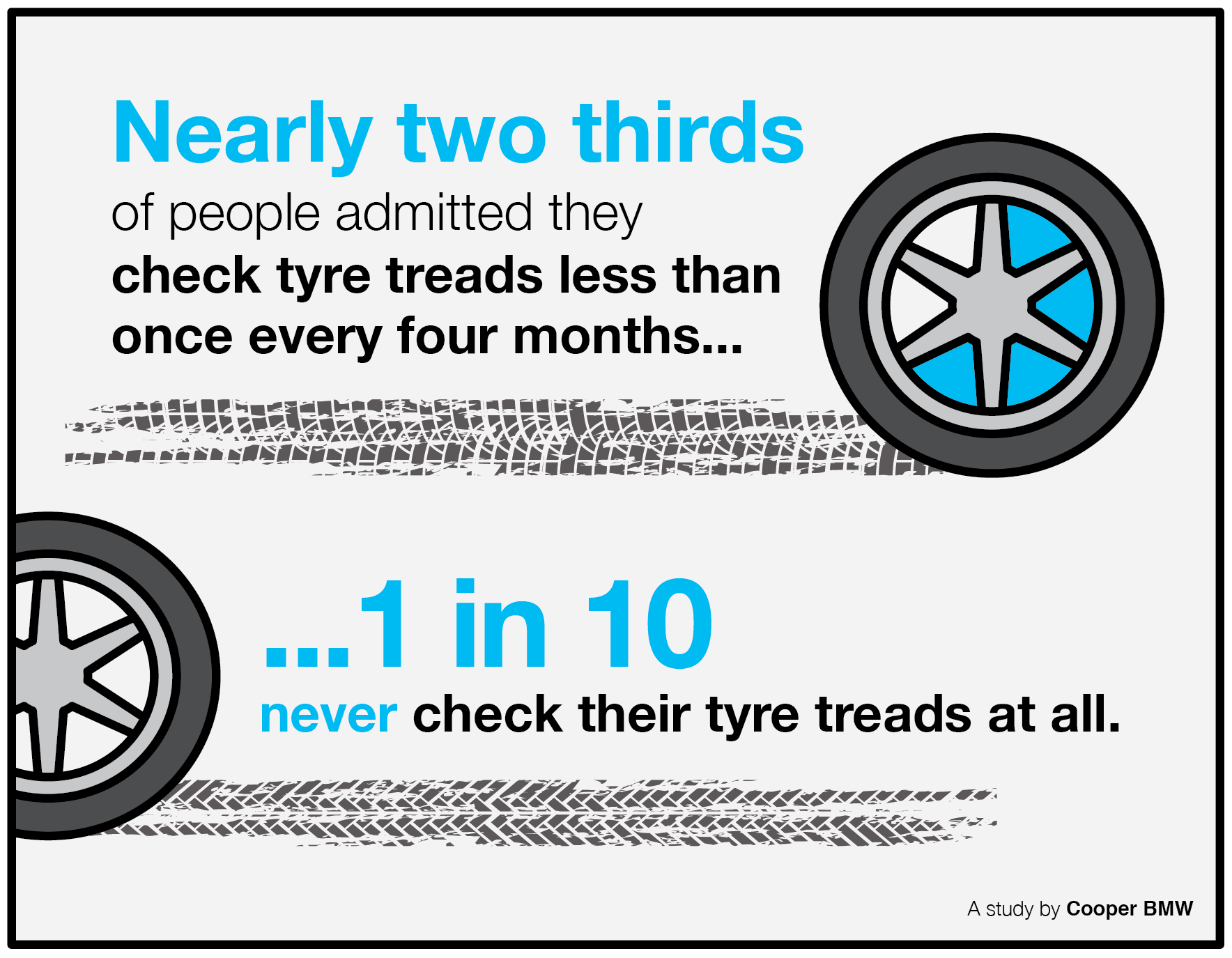
The legal minimum tread depth in the UK is 1.6 millimetres on any tyre. If your treads are shallower than this, you could face a £2500 fine and 3 points per tyre. Even at the legal minimum there are risks though. Between the depths of 3mm and 1.6mm, stopping distances in wet conditions can be increased by as much as 44%.
How-To
- Simply grab a twenty pence and stick it into the tread.
- If any of the outer band of the face of the coin is showing, the tread is too shallow.
- If this is the case, it's time to get to a garage and get that tyre replaced.
Wheel alignment
Jargon-buster:
Wheel Alignment refers to the angle each of the four wheels sit at relative to each other. Over time, the forces that act on our wheels can pull them out of position slightly, and they become misaligned.
The reality:
When we conducted our survey, over a quarter of people told us they never check their wheel alignment. In fact, only one in five people claimed to perform this check once a month or more- and only half of people fully understood why it's important to do so.
The risk:
Poor alignment causes your wheels to work against each other or wear unevenly- slowing you down and reducing the lifespan of the tyres. If you notice your car is pulling to one side, vibrating a lot or the steering wheel seems crooked, you need to check your wheel alignment as soon as possible.
How-To
- First is to check the 'toe'. This is to check the wheels are running parallel when viewed from above. To do this, grab a piece of string and measure the distance between the front-most point (half way up) between the two sets of tyres (front and back).
- Repeat, checking the distance between the back-most points. If the distances are different, the toe is off.
- Next you need to check the camber. This is a check that the wheel is sitting 90 degrees from the ground, and isn't tilting. Make a giant set square from a piece of card and place it against the wheel.
- If your wheels are misaligned, we recommend you take your car to a garage and get a specialist to take a look.
Brake pads
Jargon-buster:
These are metal pads, on each tyre, that work with the brake discs to slow your car. When the brake is activated, the pads press against the disc with a particular pressure, using friction to help slow the wheels.
The reality:
Functioning brake pads are vital. They're particularly important in winter, when roads are slippery and visibility reduced. Despite this, just 60% of respondents in our survey fully understood why brake pad maintenance was important, with young people having a much poorer understanding. Two thirds of respondents said they checked their brake pads less than once every six months.
The risk:
Not checking your brake pads means they could wear down to the point of being dangerous without you knowing. Worn brake pads contribute to increased stopping distances and poorer control when applying the brake.
Brake pads are an imprecise science. Depending on where, how and what car you drive- they can last for anything between 25,000 and 70,000 miles. This means you should check them often, just to be safe.
How-To
- Simply take a ruler and measure them. It's recommended they should be at least 3mm thick, and if they aren't, you should take your car to a garage and have them replaced.
So how do you score?
Now we've given you the lowdown, it's time to test yourself! Are you a winter-ready driver or are you running the risk? Score yourself on the below.
Q1. How many of the following do you keep in your car? De-icer, a windscreen scraper, a tyre jack, a phone charger, drinking water, warm clothes, a blanket, engine oil, a shovel.
A. 6+
B. 3-5
C. 1-2
D. 0
Q2. When did you last inspect/measure your brake pads?
A. Less than 2 months ago
B. 2-6 months ago
C. Over 6 months ago
D. Never
Q3. How confident are you when it comes to inspecting your wheel alignment?
A. Very confident
B. Somewhat confident
C. Not very confident
D. Not at all confident
Q4. Do you understand how tyre treads work, the consequences of worn treads and the depth they are required to be by law?
A. Definitely
B. Somewhat
C. Slightly
D. Not at all
Q5. When did you last check your tyre pressure?
A. Less than 2 months ago
B. 2-6 months ago
C. Over 6 months ago
D. Never
Results
Mostly A's: You're a safe and sensible winter driver. Congratulations!
Mostly B's: You’re almost prepared, just a little more attention needed.
Mostly C's: Risky business! You've got some work to do.
Mostly D's: Total amateur. Read this guide again and get onto those safety checks ASAP!
Don't wing it this winter. Get clued up and carry out the necessary checks to stay on top of your car care. For full confidence that you're trying safely this winter, have our expert technicians get your car in optimum condition with our winter health check.
